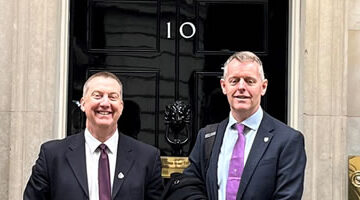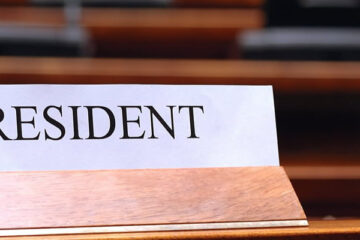Christmas is coming…

December is traditionally a time of celebration and I hope you are all able to get some time off with your families during the holiday period. Like many of you, I will be ‘celebrating’ Christmas by working overnight on Christmas Eve and Christmas Day, our patients’ illnesses and injuries are no respecter of the calendar. Our break rooms will be full of dubious looking treats. It is important that this time is adequately rewarded in turn, and I will spend the following week with my parents, though the turkey may not be as nice. This year, RCEM is supporting the disaster relief efforts in Pakistan, a country that we have such strong historical and cultural bonds with and has been devastated by climate change induced floods.
I have been enormously privileged to attend multiple conferences this autumn all over the UK, from Belfast, Milton Keynes, Edinburgh to Blackpool. It is very restorative to meet other members from other departments and share our similar experiences. I will never again take for granted the benefit of an in-person meeting. Reconnecting with other emergency medicine clinicians is so valuable, not only for the knowledge transfer, but for the cultural exchange. The volume and quality of posters at the Annual Scientific Conference showed that we are an energetic specialty, bursting with ideas to improve emergency care. I encourage all of you to consider going to some RCEM events next year.
This autumn has been a turbulent time, at the time of writing it isn’t clear whether the Government can continue in its current form and whether our nursing and paramedic colleagues are going to strike. Meanwhile, crowding continues to inexorably worsen in our departments, such that many of us run both an emergency department and a medical ward concurrently. It is tempting to make seasonal quips about there being no room at the inn, but the effect on patients, staff morale and retention must not be underestimated. We at RCEM continue to take appropriate media opportunities to inform and explain that this level of crowding is not inevitable and can be fixed with the right political will. In private, our discussions with key stakeholders do not differ very much though go into more detail than a carefully crafted sound bite. Our line has always been that long stays in emergency departments are not just inconvenient, but dangerous to patients and harmful to staff. The underlying cause is exit block, driven by inadequate bed numbers and a failure to reform and improve social care.
There is a challenge with getting this message across in the media as we have been saying it for as long as I can remember, and a repetitive message does not grab an editor’s attention. A previous RCEM Vice President wittily described our approach as ‘the RCEM broken record’. We continue to be sceptical about the value of demand management measures, which are rarely properly evaluated and have an unpleasant undercurrent of patient blaming. While we are undoubtably groaning under a workload of major ambulant patients as well, these aren’t often patients who can be discharged without any investigation or treatment. We are constantly explaining that spotting the sick ambulant patient, while not over investigating and over referring patients is a valuable clinical skill for which the rest of the hospital and our patients should be thankful for. We also take every chance to advocate that any new health policy must routinely be evaluated. Knowing if an intervention doesn’t work is just as useful as knowing whether it does. We constantly emphasise that the dominant problem is exit block and that no demand management intervention would make any meaningful difference to these very long waits. I have taken part in numerous roundtables with politicians and senior NHS managers and repeatedly emphasised these points, whether this leads to action is uncertain, but everyone has received a clear message.
While conditions are so tough, it is important to try to rise above the petty squabbles that are usually a symptom of stress and unbearable pressure. The recent ‘Mexican Standoff’ between an Ambulance Service and Emergency Department resulted from poor system leadership. While disagreement and debate should be welcomed as a way of achieving consensus, public spats achieve nothing except retro headlines. (Does anyone except a Tabloid news editor now use the phrase ‘Mexican Standoff?’)
I would love to end this article with some seasonal cheer, but fear this might sound trite and unrealistic. We must be proud of how we try to look after our patients, despite all the challenges. Our work is valued by our patients and our ability to look after ourselves and build our teams is unrivalled. We make a positive impact to our patient’s lives.
Happy holidays.
Dr Adrian Boyle
President, RCEM


0 Comments